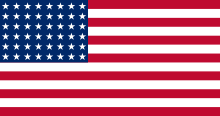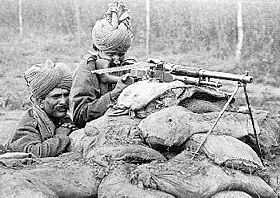Hotchkiss M1909 Benét–Mercié machine gun
| Hotchkiss M1909 Benét–Mercié machine gun | |
|---|---|
|
A Hotchkiss Mark I on display at the Steven F. Udvar-Hazy Center. | |
| Type | Light machine gun |
| Place of origin | France |
| Service history | |
| Used by | See Users |
| Wars | World War I |
| Production history | |
| Designer | Lawrence Benét and Henri Mercié |
| Designed | 1901 |
| Manufacturer | Hotchkiss et Cie |
| Produced | ~1909 |
| Number built | ~700 by Springfield Armory |
| Variants |
Hotchkiss M1909 (French Army, 8×50mm Lebel) Hotchkiss Mark I (Britain, .303) Benét–Mercié Machine Rifle M1909 (United States, .30-06) |
| Specifications | |
| Weight | 12 kg (26.5 lb) |
| Length | 1.23 m (48 in)[1] |
| Barrel length | 64 cm (25 in)[1] |
|
| |
| Cartridge |
.303 British (Britain) 8mm Lebel (France) .30-06 Springfield (U.S.) |
| Caliber |
.303 British 8mm Lebel 7.62×63mm (.30-06 Springfield) 7mm Mauser |
| Action | Gas-operated |
| Rate of fire | 400-600 rounds per minute[1] |
| Maximum firing range | 3800 m |
| Feed system | 30-round strip magazine, or belt-fed |
The Hotchkiss M1909 machine gun was a French designed light machine gun of the early 20th century, developed and built by Hotchkiss et Cie. It was also known as the Hotchkiss Mark I and M1909 Benét–Mercié.
It was adopted by the French army as the Hotchkiss M1909 (or Mle 1909) in 1909, firing the 8 mm Lebel.
A variant to use the .303 round was produced in Britain as the "Hotchkiss Mark I" and manufactured by Enfield. The British army employed three different types of machine gun: the Vickers medium machine gun, the Hotchkiss (for cavalry and tank use), and the Lewis Gun with the infantry.
It was adopted by the US in 1909 as the "Benét–Mercié Machine Rifle, Caliber .30 U. S. Model of 1909" firing the .30-06 cartridge. The name comes from three sources: Hotchkiss, the name of the American Benjamin B. Hotchkiss who started the company in France; the two main designers, Lawrence Benét and Henri Mercié; and the US designation system at time which label arms with "Model of Year". Lawrence Benét was related to the former head of US Army Ordnance at the time of adoption.
It is also known as the Hotchkiss M1909 and M1909 Benét–Mercié, but should not be confused with the heavier Hotchkiss M1914 machine gun.
It was also used by other countries, including Belgium, Spain, Brazil and Australia.
Design
It was gas-operated and air-cooled, had a maximum range of 3,800 m (4,200 yd) and weighed 12 kg (27 lb). Initial models were fed by a 30-round strip-magazine but later models could be either strip- or belt-fed. The US types had a bipod, while some others used a small tripod. This tripod, fitted under the firearm, could be moved with the weapon, and was very different from larger tripods of the period.
The U.S. M1909 machine guns were made by Springfield Armory and by Colt's Manufacturing Company. Total production for the United States was 670.[1] This may seem small compared to the huge production runs of firearms later in the 20th century, but this was a significant number for the size of the contemporary US Army. The M1909's adoption coincided with the withdrawal of the .30-06 manually operated Gatling guns from the US Army's arsenals.
Service
France and Britain used the Hotchkiss M1909 through World War I and on into World War II. The Australian Light Horse, the New Zealand Mounted Rifles Brigade and the Imperial Camel Corps used the Hotchkiss in the Desert Campaign in Sinai and Palestine (1915–17).[2] US forces used the Benét–Mercié in the Pancho Villa Expedition in Mexico of 1916–17 and initially in France. Firing pins and extractors broke frequently on the American guns. United States troops called the M1909 the "daylight gun" because of the difficulty in replacing broken parts at night and jams caused when loading strips were accidentally inserted upside down in darkness.[1]
Users
.svg.png) Austria-Hungary
Austria-Hungary Australia
Australia.svg.png) Belgium
Belgium Brazil
Brazil France
France Ireland
Ireland New Zealand
New Zealand Republic of China
Republic of China.svg.png) Spain
Spain United Kingdom
United Kingdom United States
United States
Gallery
-

2nd Queen Victoria's Own Rajput Light Infantry gunners in Flanders, winter of 1914–1915 -

Old Glory postcard with U.S. soldiers firing an M1909 machine gun
-

Hotchkiss Mark I on display at the Steven F. Udvar-Hazy Center
-
A Hotchkiss M1922 machine gun
See also
- Light machine gun
- List of individual weapons of the U.S. Armed Forces
- Huot automatic rifle
- Chauchat - Another French light machine gun that was also used by the U.S. Army
- Hotchkiss M1922 machine gun
References
Further reading
- Robert G. Segel (3 January 2012) U.S. Automatic Machine Rifle Model of 1909, Small Arms Defense Journal, Vol. 2, No. 4
External links
| Wikimedia Commons has media related to Hotchkiss Mle 1909. |
- Images from the Museum of the Soldier, Portland, Indiana
- More images: 1, 2
- Complete Guide to the Hotchkiss Machine Gun origyear=1917
- http://www.forgottenweapons.com/light-machine-guns/hotchkiss-portative-lmg/
- Handbook of the Automatic Machine Rifle Caliber .30, Model of 1909. Ordnance Department. 31 July 1916. (many good plates)
- "New Machine Guns Ordered: Vickers Recoil Type Will Replace Those That Jammed". New York Times. 24 March 1916.
- Collection of photos that appear to be either US Army photos or published before 1922
- http://img.photobucket.com/albums/v146/Ordnanceguy/US%20MGs/MGtroopSoldier.jpg
- http://img.photobucket.com/albums/v146/Ordnanceguy/US%20MGs/BenetMercierRPPC.jpg
- http://img.photobucket.com/albums/v146/Ordnanceguy/US%20MGs/MoreMGTroopsonBorder1914.jpg
- http://img.photobucket.com/albums/v146/Ordnanceguy/US%20MGs/MotorcycleMGTroop.jpg
- http://img.photobucket.com/albums/v146/Ordnanceguy/US%20MGs/M1909BMMGMotorcycleMountedRPPC.jpg
- http://img.photobucket.com/albums/v146/Ordnanceguy/US%20MGs/BenetMercierMGPlatoon27thInf19131.jpg
- http://img.photobucket.com/albums/v146/Ordnanceguy/US%20MGs/BenetMercieGroup.jpg
| ||||||||||||||||||||||||||||||
| ||||||||||||||||||||||||||||||||||||||||||||||||||||||||||||||||||||